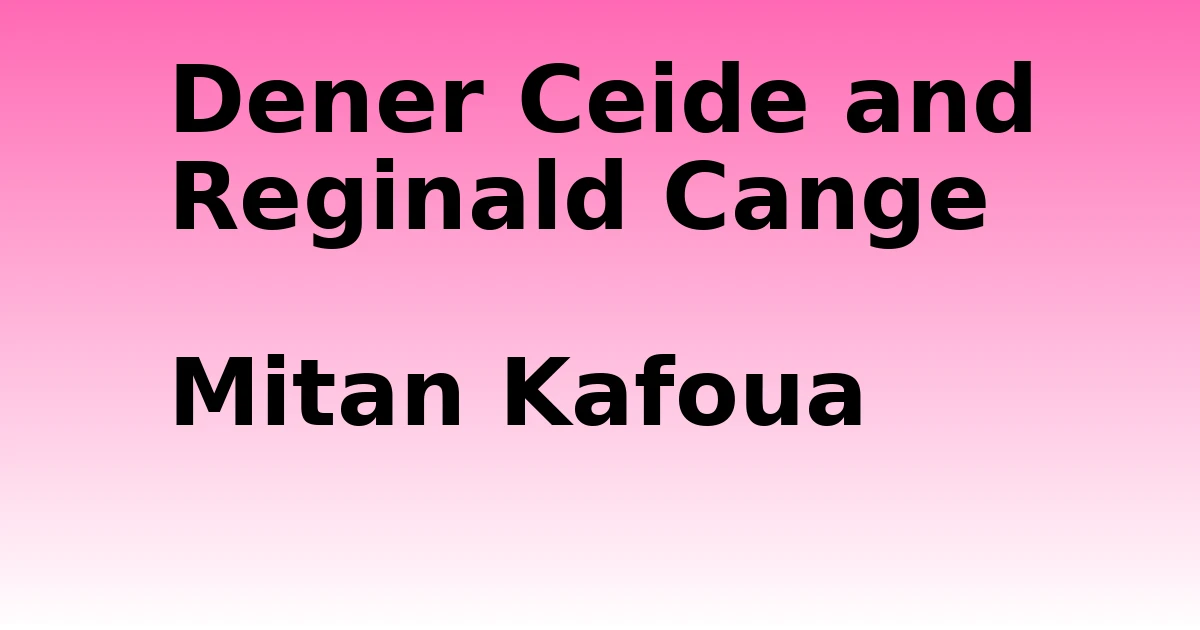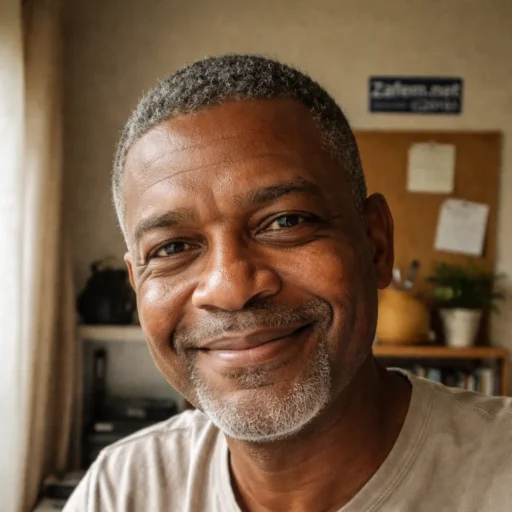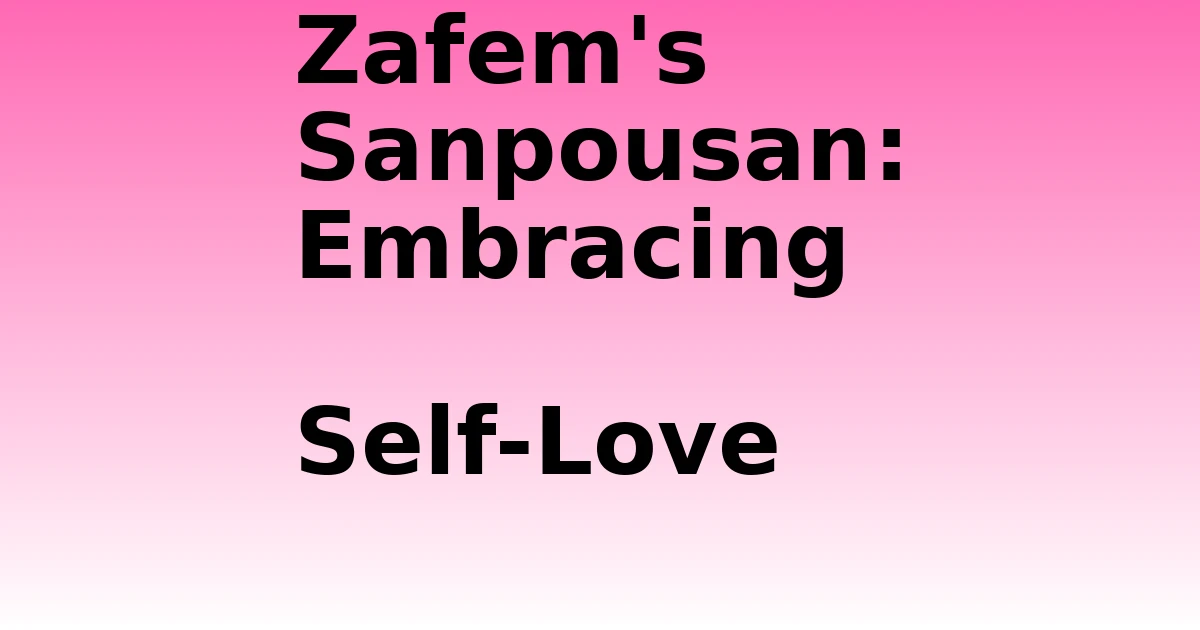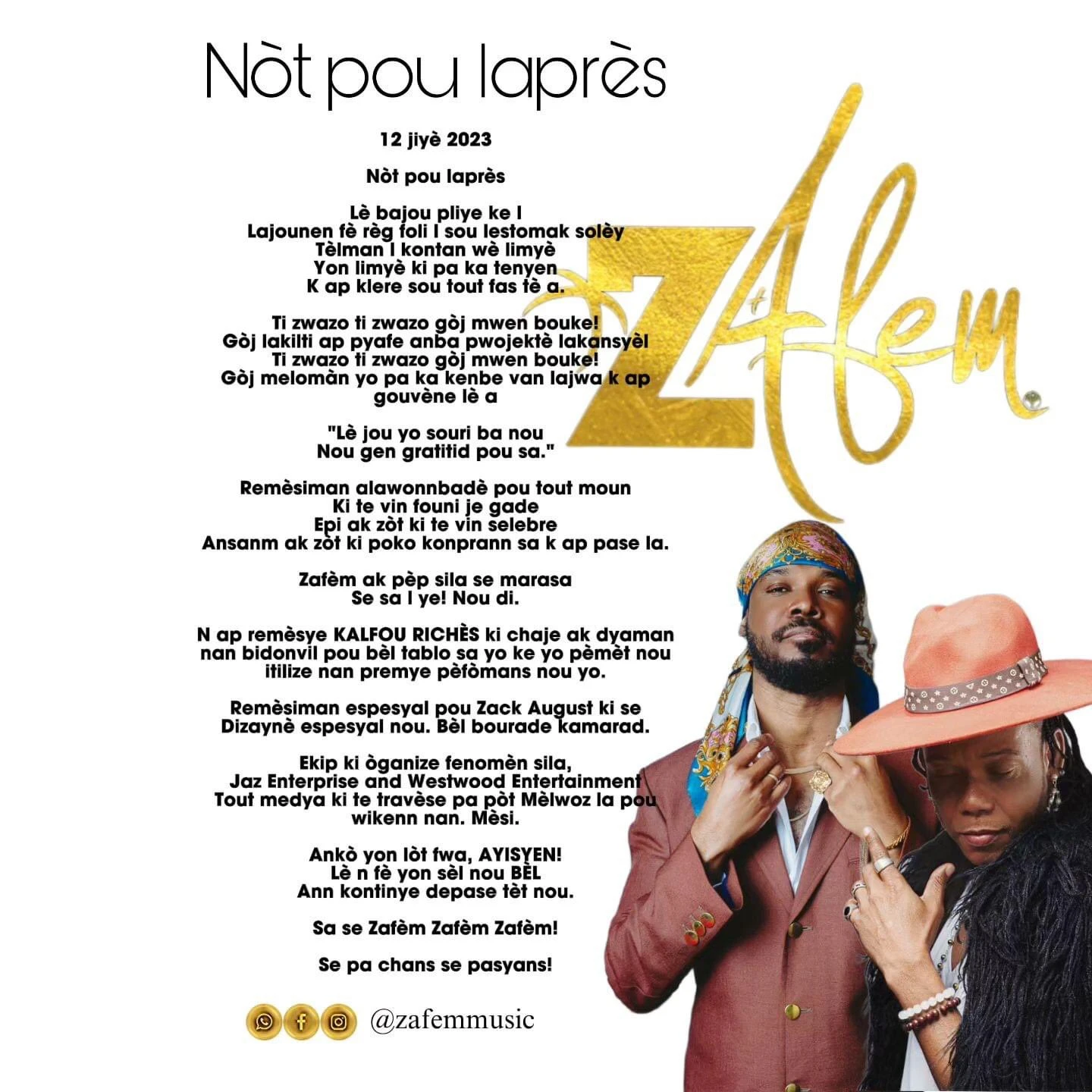In the vibrant landscape of contemporary Haitian music, few entities have captured the public imagination quite like the group ZAFEM. Led by the dual talents of Dener Ceide and Reginald Cange, the band represents a sophisticated evolution of the Konpa genre, blending technical mastery with deep emotional resonance.
Their journey, however, is not merely a story of recent success but a culmination of lifelong dedication, cultural immersion, and the specific socio-political history of Haiti.
During a revealing interview on the program “Mitan Kafoua” (The Crossroads), hosted by Gregory Marc Lubin, the two musicians offered a rare glimpse into the formative experiences that shaped their artistry.
The conversation moved beyond standard promotional talk, delving into the nuances of childhood in the Haitian provinces, the impact of political revolutions on artistic expression, and the spiritual rhythms that permeate daily life in the Caribbean.
Understanding their background provides listeners with a richer context for the complex arrangements and lyrical depth found in their current work.
This exploration of their dialogue highlights how geography, history, and family traditions converge to create world-class musicians. From the AM radio waves of Saint-Louis du Sud to the polyrhythmic streets of Carrefour, the origins of ZAFEM are rooted in the very soil of Haiti.
The following sections analyze these key influences, translating their personal anecdotes into a broader understanding of Haitian musical heritage.
The Cultural Significance of ZAFEM in Modern Haitian Music
To understand the weight of the interview, one must first understand the position ZAFEM occupies in the industry. In a market often dominated by rapid-fire singles and synthesized loops, Dener Ceide and Reginald Cange have returned to a more organic, instrumental approach. Their collaboration brings together two distinct archetypes of the Haitian music scene: the maestro-composer and the charismatic vocalist. This synergy allows them to bridge the gap between traditional Konpa Dirèk and modern jazz-fusion sensibilities.
Dener Ceide is widely recognized as one of the most prolific songwriters and guitarists of his generation. His compositions are known for their harmonic complexity and lyrical storytelling, often touching on themes of nostalgia, love, and social observation. His role is that of the architect, constructing the musical frameworks that allow the melody to shine. His influence extends beyond his own performance; he has penned hits for numerous other heavyweights in the industry, making his sound ubiquitous even before ZAFEM was officially formed.
Reginald Cange, conversely, represents the soulful voice of the people. Known for his vocal range and improvisational skills, he carries the legacy of the classic Haitian crooner while injecting a raw, energetic performance style. His ability to connect with an audience is rooted in a deep understanding of rhythm and cadence. Together, their partnership signifies a commitment to musical excellence that resonates with listeners who crave substance alongside entertainment.
Dener Ceide: Saint-Louis du Sud and the Sounds of the Province
Geography plays a pivotal role in the development of a musician’s ear. Dener Ceide’s upbringing in the 7th section of Saint-Louis du Sud placed him far from the bustling, noise-filled streets of the capital, Port-au-Prince. In the rural provinces of Haiti, the soundscape is different; it is often quieter, allowing for a deeper appreciation of distinct melodies. Ceide describes an era where FM radio—with its clear signals and local pop stations—was virtually non-existent in his region.
Instead, the airwaves were dominated by AM radio stations. Due to the physics of AM signal propagation and Haiti’s geographical location, these radios frequently picked up broadcasts from neighboring Spanish-speaking countries like the Dominican Republic and Cuba. This accidental exposure was instrumental in shaping Ceide’s musical palette. The harmonic structures of Bolero, Bachata, and Son Cubano seeped into his consciousness, influencing the way he approaches chord progressions and guitar phrasing today.

This cross-cultural auditory experience is a common but often overlooked aspect of Caribbean musicianship. While the rhythm of Haiti is distinctly African in origin, the melodic sensibilities often share DNA with the broader Latin Caribbean.
Ceide’s ability to weave these subtle Spanish influences into Haitian Konpa gives his compositions a romantic and timeless quality that distinguishes them from the strictly urban sounds of his peers.
The 1986 Transition: How Political Change Shaped a Generation
Music does not exist in a vacuum, and for Dener Ceide, the socio-political climate of his youth was a major catalyst. He specifically cites the year 1986 as a turning point. This year marks the fall of the Duvalier regime, a period known in Haiti as the Dechoukaj (uprooting).
It was a time of chaotic transition, newfound hope, and intense social discourse. For a young person growing up during this era, the atmosphere was charged with revolutionary energy.
During this transitional period, music became a primary vehicle for social commentary. Ceide points to the influence of Manno Charlemagne, a legendary Haitian singer-songwriter known for his acoustic guitar work and biting political lyrics. Charlemagne’s music was not just entertainment; it was a form of civic engagement. The “American Airlines Music Competition” and other cultural contests of the time also provided platforms for budding writers to express complex ideas through song.
This historical context explains the lyrical maturity found in ZAFEM’s discography. Growing up in a time when music was used to challenge authority and define national identity taught Ceide that songwriting carries a responsibility.
It instilled in him the belief that lyrics should possess weight and meaning, moving beyond simple romantic tropes to address the realities of the human condition and the Haitian experience.
Reginald Cange: A Life Saved and Defined by Melody
Reginald Cange’s narrative begins with a story that borders on the mystical, highlighting the profound connection between health, spirit, and sound in Haitian culture. He recounts a condition he suffered as an infant involving his eyes, which would close sporadically or appear sunken. In a moment of distress, it was not a medical procedure but a musical intervention by his grandmother that provided relief. As she held him and hummed a specific tune, the soothing vibration and melody coaxed his eyes open.
This anecdote serves as a powerful origin story. For Cange, music was literally a lifeline—a force capable of physical healing and comfort. This early exposure to the therapeutic power of the human voice set the trajectory for his life. It suggests that his singing is not merely a career choice but an extension of that early, nurturing vibration he received from his grandmother.
The environment of his childhood was a “musical school” in the most organic sense. He describes a home where music was intrinsic to existence, not an external commodity. Whether it was a lullaby, a street parade, or a radio broadcast, sound was the medium through which he interacted with the world. This immersion is critical for a vocalist, as it internalizes pitch and rhythm long before formal training begins.
Rhythms of the Lakou: The Influence of Roots and Tradition
A significant portion of Cange’s rhythmic education came from his proximity to traditional practices. He mentions being drawn to places where spiritual ceremonies took place, referring to the rhythmic blend of the Lakou (traditional communal courtyards). In these settings, the Tanbou (drum) is king. The drumming patterns used in traditional Haitian practices are complex, involving polyrhythms that require an acute sense of timing and interplay.

Cange notes that he was “immersed in a sea of music” without realizing the complexity of what he was absorbing. The beats associated with Rasinn (Roots) music and spiritual gatherings are distinct from the 4/4 time of Western pop. They are syncopated, driving, and deeply physical. By growing up adjacent to these sounds, Cange developed an internal metronome that is flexible and robust.
This background explains his comfort with the “Gouyad”—the slow, rhythmic grind characteristic of modern Konpa—as well as more up-tempo, folklore-inspired tracks. He is not just singing over a beat; he is locking into a rhythmic lineage that stretches back centuries.
His grandmother’s influence combined with the community’s drumbeats created a dual foundation of melody and percussion that defines his performance style today.
From the ‘Kata’ to the Stage: Early Professional Steps
Every master musician starts as a novice, and for Reginald Cange, that beginning involved the Kata. The Kata refers to a repetitive rhythmic pattern, often played on the side of a drum or a piece of wood/bamboo, which serves as the timekeeping foundation for the rest of the band. It is a humble but essential role. Cange recalls joining a “roots group” in Carrefour around 1989 or 1990, where he was significantly younger than the other members.
At that age, his voice was not yet developed enough for lead singing. Instead, he contributed by playing the two sticks of the Kata. This role requires immense discipline; the player cannot deviate or improvise, as the entire polyrhythmic structure depends on their steadiness.
Starting in the rhythm section gave Cange a fundamental appreciation for the groove. He learned to listen to the ensemble rather than just focusing on himself.
The novelty of a child performing with older musicians drew attention, giving him his first taste of the stage. These early experiences in Carrefour—a municipality known for its vibrant nightlife and musical output—were his apprenticeship. They taught him stage presence, the dynamics of a band, and the rigors of live performance long before he became a frontman.
The Philosophy of “Mitan Kafoua”: At the Crossroads of Success
The title of the show, “Mitan Kafoua,” translates to “The Middle of the Crossroads.” In Haitian folklore, the crossroads is a place of great significance—a point where choices are made and destinies are altered. The interview concludes with reflections on this concept of destiny versus determination.
Both musicians admit that while they had passion, the specific heights of their success were unpredictable.
Dener Ceide emphasizes the importance of self-affirmation for the youth. His advice to “speak highly of themselves” is a call for psychological resilience. In an industry—and a world—that can be dismissive of Caribbean artists, maintaining a strong sense of self-worth is a survival mechanism. He frames their journey not as a stroke of luck, but as the result of relentless passion meeting preparation.
Reginald echoes this sentiment, noting that while he had natural aptitude, life is volatile. The “crossroads” for them was the decision to pursue music wholeheartedly despite the uncertainties. Their story serves as a blueprint for the next generation: respect the tradition, absorb the influences of your environment, but ultimately, drive your own narrative through hard work and belief.
FAQ
Who are the primary members of the group ZAFEM?
ZAFEM is fronted by two prominent figures in the Haitian music industry: Dener Ceide and Reginald Cange. Dener Ceide serves as the maestro, composer, and guitarist, known for his sophisticated arrangements. Reginald Cange is the lead vocalist, celebrated for his energetic performance style and vocal range. Together, they combine years of experience from previous musical projects to create ZAFEM’s distinct sound.
How did the political climate of 1986 influence Dener Ceide?
The year 1986 marked the end of the Duvalier dictatorship in Haiti, a period known as the Dechoukaj. This era of transition brought about a surge in free expression and social commentary. Dener Ceide grew up during this time and was heavily influenced by the revolutionary spirit and the music of protest singers like Manno Charlemagne. This historical context instilled in him a desire to write songs that possess lyrical depth and social relevance, rather than just commercial appeal.
What is the “Kata” in Haitian music?
The Kata is a fundamental rhythmic component in Haitian music, particularly in Rara, Vodou, and Konpa drumming. It consists of a steady, repetitive pattern usually played on a piece of wood, bamboo, or the side of a drum using two sticks. It acts as the timekeeper or metronome for the rest of the band. Reginald Cange began his musical career as a child playing the Kata, which helped him develop an impeccable sense of timing before he became a lead singer.
Why does Dener Ceide mention Spanish music as an influence?
Growing up in Saint-Louis du Sud, a rural province of Haiti, Dener Ceide had limited access to local FM radio stations. Instead, his AM radio picked up strong signals from neighboring Spanish-speaking countries like Cuba and the Dominican Republic. Consequently, he spent his youth listening to Bolero and other Latin genres. This exposure influenced his harmonic choices, allowing him to blend Latin melodic sensibilities with traditional Haitian rhythms in his compositions.
What role did Reginald Cange’s grandmother play in his music?
Reginald Cange credits his grandmother with introducing him to the healing power of music. As an infant suffering from an eye ailment, he was soothed by his grandmother’s humming, which he describes as having a physical, curative effect on him.
This early experience established a deep emotional connection to melody, teaching him that the human voice can be a source of comfort and life, a philosophy he carries into his singing career.
What is the significance of the show title “Mitan Kafoua”?
“Mitan Kafoua” translates to “The Middle of the Crossroads” in Haitian Creole. In Haitian culture, the crossroads is a symbolic location representing choice, destiny, and the meeting of different worlds. The show uses this metaphor to explore the pivotal moments and decisions in the lives of its guests. For ZAFEM, it represents the intersection of their past struggles and their current success, as well as the blending of their rural and urban influences.




